|
|
|
Sort Order |
|
|
|
Items / Page
|
|
|
|
|
|
|
| Srl | Item |
| 1 |
ID:
150581
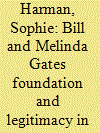

|
|
|
|
|
| Summary/Abstract |
The Bill and Melinda Gates Foundation brings to light the legitimacy problem with global philanthropy. The legitimacy problem here is twofold: first, with regard to the criteria used to assess the presence or absence of legitimacy in global governance; and, second, how analysis of legitimacy does not fully account for how we understand the legitimate basis of rule drawn from private wealth. This article begins to address this lacuna by analyzing the legitimacy of an actor that wields considerable authority in the field of global health politics and has growing prominence in contemporary global governance, the Bill and Melinda Gates Foundation.
|
|
|
|
|
|
|
|
|
|
|
|
|
|
|
|
| 2 |
ID:
145750
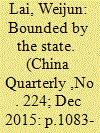

|
|
|
|
|
| Summary/Abstract |
From a regulatory perspective, philanthropy in China has been officially modernized. Since the government established a legal framework in 2004 based on models from overseas, the number of private foundations in China has grown more than six-fold. Drawing on a nationally representative survey of 214 private foundations conducted in 2012, we present a landscape view of these new philanthropic institutions, discussing both who begins foundations and how their monies are used. We find that despite the rise of new private wealth in China and the adoption of the private foundation form, government priorities are structuring the field of Chinese philanthropy in key and consequential ways. We conclude with some considerations of the implications of these findings for the development of broader civil society.
|
|
|
|
|
|
|
|
|
|
|
|
|
|
|
|
| 3 |
ID:
109122


|
|
|
|
|
| Publication |
2011.
|
| Summary/Abstract |
The Chinese Communist Party has shown tolerance, if not direct support, for the growth of Buddhism over the last few decades. Three explanations for this lenient attitude are explored in this article. The flourishing of Buddhism is encouraged by the state less for its propaganda value in foreign affairs than for its potential to lure tourists who will, in turn, represent a source of revenue for local governments. Buddhist institutions are also establishing their track record in the management of philanthropic activities in impoverished area where local governments lack the resources to offer specific social services. Finally, the development of such activities has contributed to enhance cooperation between China and Taiwan, whose governments have a vested interest in the improvement of relations across the Strait. The article concludes that the growth of Buddhism in China results from the initiatives of Buddhists themselves, and the government supports this growth because it serves local politics well.
|
|
|
|
|
|
|
|
|
|
|
|
|
|
|
|
| 4 |
ID:
164419
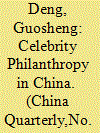

|
|
|
|
|
| Summary/Abstract |
This article provides the first comprehensive analysis of the development of, and public responses to, celebrity-fronted philanthropy in the People's Republic of China. It explores the extent and nature of celebrity philanthropy with reference to a sample of mainland Chinese celebrities in entertainment and sports. It then draws on interviews conducted with employees of large charities to examine the kinds of links that are being forged between China's not-for-profit sector and commercial organizations managing the work of celebrities. Finally, it analyses the responses to a national survey on celebrity and philanthropy. We conclude that the relationship between China's government, not-for-profit and celebrity sectors is becoming more professionalized and organized. This development reveals how the roles and capacities of government are being reconfigured and expanded, even as it also enhances the scope for action and the influence of new social actors and organizations to address government-led national development issues.
|
|
|
|
|
|
|
|
|
|
|
|
|
|
|
|
| 5 |
ID:
158561
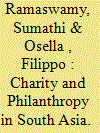

|
|
|
|
|
| Summary/Abstract |
Why should we care about giving in modern South Asia, and why now? These are among the questions at the forefront of this special issue whose contributors explore charitable practices and philanthropic transformations in diverse historical and cultural contexts across the colonial/post-colonial divide at a time when trade liberalization, the transformation of state welfare-ism, and the consolidation of a global economy has led to a deepening of neo-liberal regimes across the region as well as political and religious fundamentalisms. We also write at a time when non-governmental organizations have proliferated across the region, as has the discourse regarding humanitarian aid for a diverse range of development projects. This special issue, then, seeks to throw light on what is new and different, and what persists in the context of the region's long and well-established traditions of giving. Who gives and toward what purposes and with what stated intentions? How have acts of giving changed over time and across cultural, religious, and regional complexes? What are the institutional frameworks within which specifically local, national and regional mechanisms and instruments of giving intersect with global practices? How do the economic and financial incentives interact with ethical and affective imperatives to give?
|
|
|
|
|
|
|
|
|
|
|
|
|
|
|
|
| 6 |
ID:
128527
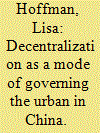

|
|
|
|
|
| Publication |
2013.
|
| Summary/Abstract |
This paper considers what a Foucauldian-informed analysis of decentralization and urban transformation offers to current debates. It analyzes decentralization as a new regime of governing, in contrast to many studies that treat it as a policy process, objective or outcome aimed at alleviating some problem of centralized authority. Rather than understanding decentralization as less state governance, this paper asks how practices such as local autonomy are in fact technologies of governing the urban. Decentralization is analyzed then not simply as an absence of some central state power, either in the political or fiscal realm, but rather, as new mechanisms of governing the urban, which are linked with the regulation and constitution of subjects. The paper focuses on an aspect of decentralization that typically is under-examined: the decentralization of welfare provisioning in urban China. Under high socialism of the Maoist era, social services for urban residents were distributed by the state, through the work unit (danwei) as part of the planned economy. In recent years, however, major reforms have been put into place to diversify the ways in which social services are delivered, under a general rubric of decentralizing the distribution away from the state. Based on anthropological research in Dalian, a major port city in northeast China, this paper examines a new social practice and subject form that has emerged with new ways of caring for those in need in the city: volunteerism. By focusing on this resulting social form, the paper argues that we may better understand how decentralization is not a singular process with multiple outcomes, but rather, a complex assemblage of elements that includes technical questions about how to govern as well as normative practices of subject formation. An analytical disaggregation of these elements also allows us to avoid the assumption that decentralization necessarily contains certain characteristics, or that it will lead to particular kinds of political and social forms.
|
|
|
|
|
|
|
|
|
|
|
|
|
|
|
|
| 7 |
ID:
142658
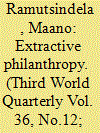

|
|
|
|
|
| Summary/Abstract |
At the centre of the conservation enterprise are the interactions of various actors who display a great deal of environmental ethic. Private landowners have embraced this ethic to protect their property rights and increase land value while contributing to the conservation of nature and to rural development. In this paper I draw examples from the lowveld in South Africa to argue that there is a seamless connection between philanthropy, labour and land claims in private nature reserves, and that post-apartheid conditions have enabled such a connection to emerge. Philanthropy allows private owners to structure and control labour, while directly or indirectly affecting the trajectory of land claims in the area.
|
|
|
|
|
|
|
|
|
|
|
|
|
|
|
|
| 8 |
ID:
164222
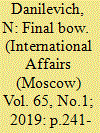

|
|
|
|
|
| Summary/Abstract |
BARON Eduard Alexandrowitsch von Falz-Fein passed away at the age of 107 at his villa in the Principality of Liechtenstein. He is well known in Russia for his generous philanthropy and ambitious international projects. He helped repatriate artifacts with historical significance for the Russian state, restore Orthodox churches, establish museums, preserve Russian graves abroad, and develop new tourist routes.
|
|
|
|
|
|
|
|
|
|
|
|
|
|
|
|
| 9 |
ID:
193166
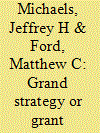

|
|
|
|
|
| Summary/Abstract |
The relationship between Strategic Studies and the American academy has always been a tenuous one. Tolerated when fully funded, the field quickly lost its place on campus when it failed to attract grant money. Only with the support of philanthropic foundations did it manage to gain a foothold in American universities. What emerges from our investigation is how the field has feasted during times when foundation money was available and suffered periods of famine when these funds were withdrawn. In addition, we show that during and immediately after the Cold War, the political interests of philanthropic foundations were broadly balanced. By contrast, over the last two decades, the field has been increasingly linked to financial support provided by politically right-leaning foundations. This is happening while funding from more centrist and left-leaning foundations has become much less prominent. When looking ahead at the field’s future health, we cannot but help be concerned about the implications of this development.
|
|
|
|
|
|
|
|
|
|
|
|
|
|
|
|
| 10 |
ID:
187911
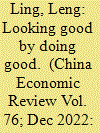

|
|
|
|
|
| Summary/Abstract |
We investigate the effect of male corporate managers' physical appearance—classified into unattractive, average-looking, and attractive—on the philanthropic decisions of Chinese listed firms. We find that compared to average-looking managers, those who rated as attractive do not engage more actively in corporate donations. On the contrary, the probability of donating is approximately 5% higher for unattractive managers than for average-looking managers; further, unattractive managers donate 95% more in charitable giving. To explain these findings, we propose a psychological channel through which physical appearance may influence male managers' charitable donations: Because altruistic behaviors may aggrandize individuals, managers conscious of deficits in their own physical attractiveness may engage in prosocial behavior to increase their attractiveness in the eyes of others. We find consistent evidence that the effect of managers' unattractiveness on philanthropic decisions is stronger in firms with weaker corporate governance; further, we find that the positive impact of corporate donation on financial performance observed in firms led by attractive and average-looking managers is substantially weaker in those firms led by unattractive managers
|
|
|
|
|
|
|
|
|
|
|
|
|
|
|
|
| 11 |
ID:
090513
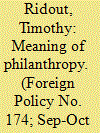

|
|
|
|
|
| Publication |
2009.
|
| Summary/Abstract |
In Latin America, the culture of philanthropy is not a strong as in other parts of the world. Charity has always been present there, but it is often informal and done through personal relationships or the Church.
|
|
|
|
|
|
|
|
|
|
|
|
|
|
|
|
| 12 |
ID:
173794
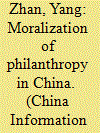

|
|
|
|
|
| Summary/Abstract |
Neo-liberalism shifts social responsibility to individuals. The practice of neo-liberal governmentality in China confirms this worldwide trend. This is evident when government retreats from the responsibilities of providing social welfare for rural migrant workers and leaves them to privately funded philanthropy programmes. However, the Chinese case also presents an anomaly in that the shifting of responsibilities under neo-liberalism results not only in individualization, but also in mutual obligations created by moralization. This article explores philanthropy programmes in migrant settlements in contemporary Beijing within a larger neo-liberal context. It provides an ethnographic account of the moralization process informed by the culturally specific notion of aixin (爱心), or loving heart. I argue that moralization within philanthropy programmes is crucial in reconfiguring the modes of responsibility in post-socialist China. Here, social obligations and consolidation of old hierarchies and social inequalities go hand in hand with social individualization.
|
|
|
|
|
|
|
|
|
|
|
|
|
|
|
|
| 13 |
ID:
128469
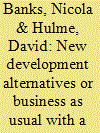

|
|
|
|
|
| Publication |
2014.
|
| Summary/Abstract |
The state, market and civil society constitute the three main institutional domains of the 'development' landscape. Perceptions of these three actors have evolved over time alongside conceptualisations of what constitutes and best promotes 'development'. The array of contributions in this special issue points towards a worrying implication for the transformative potential of development activities and interventions. While the new diversity in actors and alliances brings new opportunities for development, we see the majority placing the responsibility for development in the hands of the state and market. Furthermore, the hollowing out of civil society - apparent from the lack of priority given to it in the Global South and the promotion of development as 'responsible consumerism' in the North - represents a missed opportunity for consolidating the progress made in the commitment to poverty reduction since the UN Millennium Declaration. Reaching greater transformative potential would require focusing as much on inclusive social development as on inclusive economic development. Doing so would tackle the big questions of power and inequality that remain among the root causes of poverty today.
|
|
|
|
|
|
|
|
|
|
|
|
|
|
|
|
| 14 |
ID:
090520
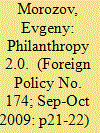

|
|
|
|
|
| Publication |
2009.
|
| Summary/Abstract |
Even the most skeptical observers of technology cannot deny that the advent of new media characterised by revolution in self publishing and the forthcoming arrival of the next billion Internet users has the capacity to radically transform the world of philanthropy.
|
|
|
|
|
|
|
|
|
|
|
|
|
|
|
|
| 15 |
ID:
158595
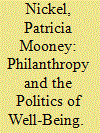

|
|
|
| 16 |
ID:
121052
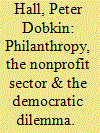

|
|
|
|
|
| Publication |
2013.
|
| Summary/Abstract |
The central dilemma of American democracy is the tension between "voice" and "equality": between the Constitution's unconditional guarantees of citizens' expressive, associational, and property rights and the legal and political equality that is the foundation of majoritarian decision-making. Philanthropy and nonprofit organizations - which enable citizens to give money and time to support causes in which they believe - have posed this dilemma with unusual force, allowing moneyed minorities to oppose and sometimes overwhelm the popular will. In the past, these assertions of private power have inevitably aroused popular opposition producing legislative and regulatory outcomes that have maintained a balance between voice and equality. Today, with unprecedented accumulations of wealth and legal changes permitting the unrestricted use of wealth in politics, the unchallenged exercise of private power through philanthropy and the nonprofit sector poses grave threats to the democratic process.
|
|
|
|
|
|
|
|
|
|
|
|
|
|
|
|
| 17 |
ID:
190920
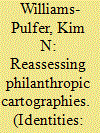

|
|
|
|
|
| Summary/Abstract |
The definition of philanthropy is contested with variations across time and global context. The article will centre on the Caribbean with its numerous identities to highlight inclusive philanthropic practices. Through an analysis of Caribbean history, theoretical foundations, and contemporary analysis, three social classes or ideal types are identified. These include 1) the colonial dominant, 2) the Black or creole middle class and 3) the resisters or grassroots/marginalized populations. Drawing on these ideal types, the analyzes three categories of philanthropic practice developing within and through the Caribbean, including 1) the philanthropy of colonial dominance, 2) philanthropy of cultural mediation and 3) philanthropy of anticolonial resistance. The Caribbean offers an ideal context for understanding traditional forms of philanthropic action and 'philanthropy from below,' highlighting issues of power, oppression, and social transformation that impact the region's ongoing development.
|
|
|
|
|
|
|
|
|
|
|
|
|
|
|
|
| 18 |
ID:
152537
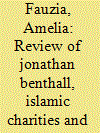

|
|
|
|
|
| Summary/Abstract |
Do charities flourish more in troubled times than in good times? The story of The Good Samaritan may be the first, and perhaps the best-remembered, illustration for those who agree that this is, in fact, the case. In responding to misery and hardships, human affection grows and humanitarian activities increase to ensure that assistance for the needy is moved through many channels. This phenomenon has been observed throughout history, including in Muslim societies and Islamic charities. However, the so-called ‘War on Terror’ (especially with its unjustified blacklisting of certain charities) has been a major source of problems for the existence of Islamic charities as well as for Muslim religiosity and identity. The current political crises in the Middle East have produced not only floods of migrants who flow out of countries in conflict zones, such as Syria, but also flows of charitable aid that arise in response to appeals and are delivered in response to these troubles. Islamic charities are thus put in a delicate position as a consequence of the suspicions that are directed towards them. In such cases and in such times, how do Muslims, Muslim communities, and Islamic charities respond to troubling events that are taking place in Muslim-majority countries and beyond? Do they respond and develop differently from Western and other faith-based charities?
|
|
|
|
|
|
|
|
|
|
|
|
|
|
|
|
| 19 |
ID:
164435
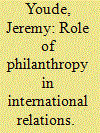

|
|
|
|
|
| Summary/Abstract |
Global philanthropy is a significant source of financial resources in contemporary international relations, and it has provoked intense debates about the appropriateness of involving private foundations in global policymaking. Despite these facts, International Relations as a discipline has shown remarkably little reference to philanthropy as an important and relevant actor in global politics. In this article, I make the case for explicitly incorporating philanthropy into international relations analyses. Drawing on both historical examples and contemporary cases from the global health space, I show how philanthropy exerts a unique and independent influence within international society and that it needs to be understood holistically rather than focusing solely on individual philanthropic organisations. I also discuss how this expanding influence raises serious questions about accountability and legitimacy. Rather than making an argument about the appropriateness of philanthropy’s involvement in international society, this article aims to make the case for philanthropy’s analytical inclusion within the discipline.
|
|
|
|
|
|
|
|
|
|
|
|
|
|
|
|
| 20 |
ID:
189070


|
|
|
|
|
| Summary/Abstract |
This photo essay provides a visual archive of Parsi philanthropic efforts toward the Iranian Zoroastrian communities of Yazd, Kerman, and Tehran during the 1930s. The essay reproduces a collection of photographs from a photo album produced by the Iranian Zoroastrian Anjoman (est. 1918) for the benefit of Parsi audiences in Bombay. These photographs were taken and compiled by administrators of the Parsi-funded charities in order to demonstrate to Bombay-based Parsi benefactors how their charity efforts were being used inside Iran. The essay also discusses the importance of including visual archival material as part of the social and cultural history of modern Iran, as well as the unique sets of challenges that such archival preservation represents.
|
|
|
|
|
|
|
|
|
|
|
|
|
|
|
|
|
|
|
|
|